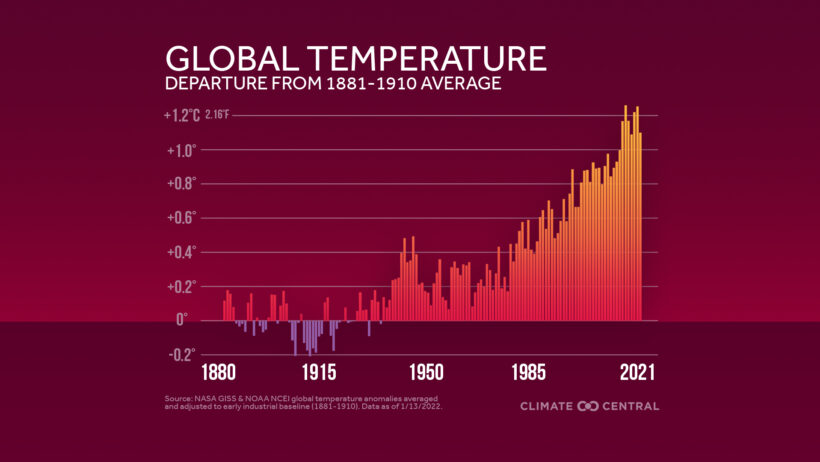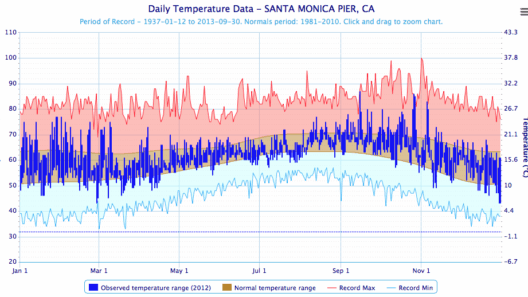Climate temperature refers to the long-term average of weather patterns over a significant period, typically 30 years or more. It encompasses the variations in temperature, humidity, wind, precipitation, and other atmospheric elements that define the climate of a region or the planet as a whole. Understanding climate temperature is crucial for grasping how dynamic systems interact within Earth’s atmosphere, influencing ecosystems, human activity, and global climate policies.
Historically, climate scientists have distinguished between various types of temperatures: surface temperature, which refers to the air temperature near the Earth’s surface; ocean temperatures that affect sea levels and marine ecosystems; and even atmospheric temperatures at different altitudes, which can indicate broader climatic shifts. These measurements come from numerous sources, including satellite data, weather stations, and ocean buoys, all of which contribute to a comprehensive understanding of global climate systems.
Date shows a disturbing trend: global temperatures are rising year after year. This phenomenon is primarily attributed to anthropogenic activities—those activities resulting from human actions—such as fossil fuel burning, deforestation, and industrial processes. These actions significantly increase greenhouse gas concentrations in the atmosphere, leading to an enhanced greenhouse effect.
The greenhouse effect, a natural process, contains crucial components: carbon dioxide (CO2), methane (CH4), nitrous oxide (N2O), and other greenhouse gases trap heat from the sun in the Earth’s atmosphere. While this process is essential for maintaining a habitable planet, the excessive accumulation of these gases due to human activities has led to an unprecedented rise in global temperatures. Since the late 19th century, the Earth’s average surface temperature has increased by approximately 1.2 degrees Celsius, prompting severe consequences such as extreme weather events, loss of biodiversity, and sea-level rise.
When examining the causes of rising climate temperatures, it is vital to explore three critical components: energy production, transportation, and land use. The energy sector is the largest single source of global greenhouse gas emissions. The burning of fossil fuels—coal, oil, and natural gas—to generate electricity and power industrial activities releases significant CO2 emissions into the atmosphere. As global energy demands surge, particularly in developing economies, this trend shows no sign of abating. Transitioning to renewable energy sources is paramount for mitigating temperature rise.
Transportation, another pivotal sector, contributes substantially to greenhouse gas emissions. Cars, trucks, ships, and airplanes primarily dependent on fossil fuels exacerbate atmospheric carbon concentrations. The shift towards electric vehicles is a positive movement, yet it remains a small fraction of total transportation emissions. Additionally, improving public transport systems and investing in sustainable infrastructure could significantly reduce the transportation sector’s carbon footprint.
Land use changes, such as deforestation for agriculture, exacerbate climate temperature rises by diminishing the Earth’s capacity to absorb carbon. Forests act as crucial carbon sinks, sequestering CO2 from the atmosphere. However, the unsustainable practice of clearing forests for agricultural land not only contributes to the emissions of captured carbon but also reduces biodiversity and disrupts local ecosystems. Sustainable agricultural practices and reforestation are vital strategies to minimize these effects.
Though the overwhelming evidence of rising global temperatures stems from scientific observations, a segment of society still contests the legitimacy of climate change discussions. This skepticism is often fueled by misinformation, differing political views, or economic interests. However, the nascent field of climate science is impervious to manipulation when scrutinized through the rigorous methodologies of scientific inquiry. Published data from diverse climatic studies repeatedly affirms a clear trend in rising temperatures coupled with detrimental environmental changes.
Consequences of rising climate temperatures reverberate globally, impacting not only physical environments but also creating socio-economic challenges. Rising temperatures contribute to increased sea levels, endangering coastal cities and entire nations. The frequency and intensity of extreme weather events, such as hurricanes, droughts, and floods, are also on the rise, negatively affecting agriculture, infrastructure, and human livelihood.
Moreover, rising temperatures can exacerbate public health crises. Vector-borne diseases, heat-related illnesses, and respiratory issues are all on the rise as a direct consequence of climate change. Vulnerable populations, particularly in developing nations, face the brunt of these impacts, revealing stark inequalities in resilience to climatic shifts. These disparities underscore the urgency for global action towards ameliorating climate-related issues and enhancing adaptive capacities among affected populations.
Countering the trajectory of rising climate temperatures requires a concerted global effort marked by international collaboration and national commitment. Implementing policies that enforce emissions reductions, investing in renewable energy technologies, and promoting carbon-neutral initiatives are crucial. Moreover, elevating public awareness regarding climate literacy plays an essential role in mobilizing collective action. Such initiatives can catalyze poverty alleviation while preserving ecosystems and human health.
In conclusion, understanding climate temperature and its escalating trend is vital for comprehending the larger narrative of climate change. Recognizing evidenced-based consequences and acknowledging the socio-economic labyrinth tied to climate actions paves the way for informed decision-making. Addressing the issues surrounding climate temperatures head-on is not merely an environmental imperative; it is a profound ethical obligation to future generations and the planet.








